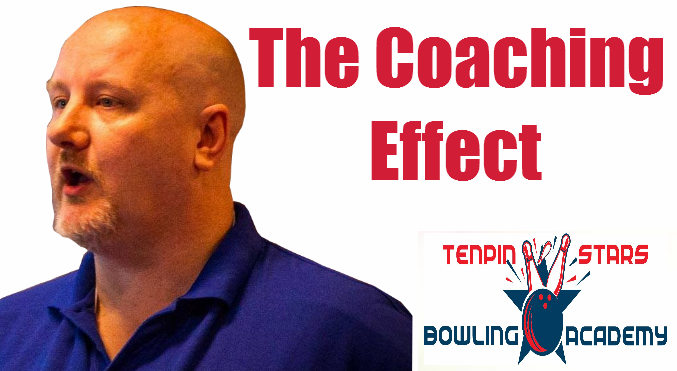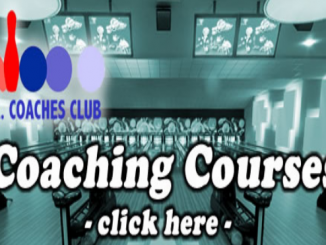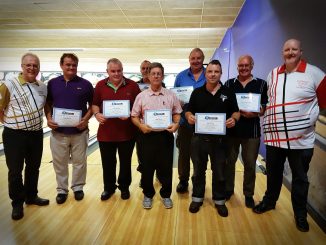
Welcome to my new regular column talking about the “coaching effect, and how this relates to coaches, bowlers, and the business of tenpin. The purpose of this column is to help build the importance of coaching within our sport and in particular the balance between training and competition at different stages of player development. I will look to share my experience and knowledge from the perspective of the bowler and as a coach. I hope you find it an enjoyable read and beneficial.
During the time I have been involved in this game (over 35 years) it has changed considerably on many fronts; from the surface we play on (and our understanding of that surface), the oil we place on the surface, the methods and machines we use to clean the lane and apply the oil, the centres we play in, the balls we roll, the methods we use to roll the ball, what we record the scores on, to wider effects such as the internet and mobile devices to the mix of type of bowler demographic and reason for going bowling. Suffice it to say that tenpin bowling is a very different sporting industry now, compared to then and exists in a very different world. Comparison between these different times is mostly a fruitless exercise so I will keep it to the minimum but there will be times when it is necessary for the sake of reference or context.
So, what do I mean by “the coaching effect”?
I hope that my writing will enable some coaches (and bowlers) to improve their knowledge about coaching in general, what elements, attitudes and behaviours make up an “effective coach”, how they effect our athletes, and the effect of coaching on the industry of tenpin bowling.
There are thousands of coaches in the world and they will all have a particular reputation; perhaps they are seen as “good coach” or even a “great coach”; or maybe “she’s so nice to the kids” or “he’s a brilliant motivator” (and many other phrases) are how you are described! As nice as these words and phrases are they do not actually define the ability of the coach and may only describe one area of knowledge or skillset (and effectiveness). These descriptions will usually come from the perspective of parents and bowlers whom to be blunt, and this is no criticism, may not know any better, especially if they have no comparison from other sports.
The judgement of a coach’s ability (and methods) is often confused between perceived knowledge (qualifications), medal hauls of their athletes, and dedication to the sport in terms of time and longevity. These are all key ingredients but what actually measures the ability of a coach is the speed at which they are able to embed physical technique and game knowledge, based on the ability of the player at the start of the relationship, coupled with being able to visualise the outcome for the bowler and plotting development stages.
If you are a coach reading this I ask you to consider the following question around your mindset, reputation and motivation to coach. Are you concerned more with wanting to become a “great coach” or a brilliant motivator” by way of medals and results – all outcome focussed; or are you more concerned with the methods you prescribe, the effectiveness of your methods and your adaptability within different situations (players, ages, stage of development) – which are process focussed? Ensure that you are doing right by you, and by your athlete.
If you are a bowler reading this (or a parent of a bowler) who has a coach or is looking for one; ask yourself what is more important to you (or your child) in terms of the motivation of the coach and the effectiveness of the methods that they implement? Ensure you engage with the coach that will have your best interests at heart (and not their own).
Effective coaching in my mind is the ability of the coach to deliver sessions which are engaging, memorable, have a purpose and a plan, and ultimately embed knowledge and skills into the athlete in the most efficient manner. The effect of effective coaching is that you create bowlers who want to play more, train in the best manner, are focussed on various goals, enjoy tenpin bowling more and subsequently roll more strikes and miss fewer spares. Surrounding this framework though is the capability and realisation to be flexible.
John Lyle (Sports Coaching Concepts, 2002) writes, “although the term is used somewhat imprecisely, method (of coaching) should not be thought of as a ‘style’ issue but as a more general set of practice recipes that the coach applies to the varying circumstances at hand. It is this element of application that provides some potential for evaluating effectiveness”. He goes on to say; “accepting that there will be different sets of recipes for practice, the question is whether (1) these conform to established principles of good practice, and (2) whether the coach has applied the recipes appropriately. If so, this will obliviate the dangers of lack of individualisation and “fitting performers to the method”.
The critical concept is that “in the sense that effective coaches have demonstrated their effectiveness over time, it is likely that they will have developed a professional practice that is both efficient and effective. Method, then, is a set of preferred routines and recipes that have been ‘proved to work’ in varying circumstances.”
When this happens the positive effect of coaching can be maximised and the coach has their true reward and satisfaction, belief in their methods, motivation to do more, and joy at others development and achievement. The bowler in this environment develops trust of the coach (and their methods), will improve their results at whatever stage they are at, and in turn be more motivated and confident. Sounds simple doesn’t it? Just like any other profession though, the role of a tenpin bowling coach is learnt, practiced, performance reviewed, improved, learnt, practiced and so the cycle continues…..indefinitely. Or so it should be.
The difference of course between a paid profession and the role of the tenpin bowling coach is that the vast majority of our instructors and coaches are volunteers, and as such are either not financial or time rich enough, interested in or coaching within a system or structure that promotes or allows the cycle of learning and development as described. This is part of where we must alter as a sport and is one of the biggest challenges our particular sport faces in being truly recognised as a sport let alone being accepted as an Olympic participation event. It is vital then that as individual coaches we seek to improve and learn, be honest with where we sit within the bigger picture (be that the centre you coach in, your county, your country or even the world) in order to understand what you need to learn and develop for the environment you are in and prepare for the one you want to coach in.
It’s all well and good talking about theory and concept but I live and coach in the real world, I hear you say. Absolutely, I agree, but the importance of theory and concept is that it underpins the foundation of what you do every time you step on the lanes with a player or stand in front of them in a classroom setting. To be the most effective bowler you need to have excellent fundamental movement patterns, and to be the most effective coach you need to have excellent fundamental coaching skills which define the process of coaching. The are formal qualifications in the Principles of Coaching Sport which cover such topics as session planning, evaluating training needs, safety, and lifestyle, but for me there are traits and skills to consider before learning the theory. This list (in no particular order) is of course subjective and the importance of each may vary from coach to coach but when I train coaches I will look for these traits and help to improve them where necessary and plausible;
- Genuine interest in learning – as opposed to just wanting a certificate
- Communications skills –
- – questioning techniques
- – listening skills
- – visual awareness
- Timekeeping
- General interaction and attention
Although communication skills can be learnt and improved over time I find it very beneficial for new coaches to have these skills already because it helps the initial period of coaching post learning. The way individuals relate and interact with others will give a good indication of how effective a coach can convey instructions and information and being able to use questioning techniques to understand knowledge and to check understanding – rather than always asking closed questions – is a very useful skill at all levels of coaching. Visual awareness is important for a sports coach as what a player does and what is going on in the sporting environment will help to ensure a positive working relationship based on correct interpretations of technique and trust in what both parties are seeing and actioning. This is what we mean by the “coaches eye”. It can certainly be trained and developed and will improve the more often you coach, the more players you work with, and as you work in different environments and can develop indefinitely. When you get to the stage in your coaching career where every time you walk into a bowling centre, whether you are actually taking a lesson or not and you find yourself watching bowlers and assessing their game in your head you will know that your visual awareness is in good shape!
What a coach does and says both in a coaching environment and outside of the coaching environment can and will have a big impact on your students. One of the biggest challenges our sport faces with such a vast volunteer work-force is being able to monitor and evaluate coaches. This process of understanding begins with the expectation of what a coach should be doing and their accountability thereof. How many coaches do you know that will say they have “been coaching” when in actual fact they sat behind the lanes, coffee in hand, shouting the odd instruction to a child. This is not coaching, nor is it instruction; it is actually causing more harm than doing nothing at all, and should have no place in our sport. This may be controversial but if this is what your coach does then tell them you no longer wish them to be your “coach”. Please go and find a real coach.
If you are a coach then think about what you currently do, when you give instruction or coaching and whether you are delivering this in such a way that it conforms to established principles of good practice, and whether you have applied the recipes appropriately. Everything we do as coaches reflects on the image of our sport. Choose to have a positive effect!!
Next time:- “The FUNdamentals of Bowling”
Tenpin STARS Bowling Academy offers a modern and professional option for bowlers of various ages and abilities to train on a (roughly) monthly basis in groups of 8, with the emphasis on steady and sustainable development of skills, knowledge, confidence and motivation.
ETBF Level 3 & USBC Silver Coach Mark Heathorn provides professional coaching services for bowlers and coaches at various locations.



